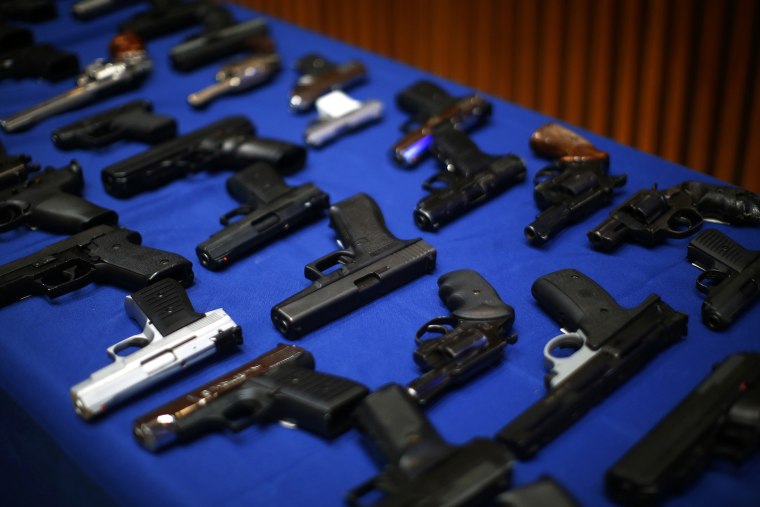Massachusetts state legislators passed a gun bill in the House on Wednesday that not only aims to bolster existing laws, but also intends to serve as a reform model for the entire nation.
The sweeping bill is the first of its kind in the country to increase record-keeping efforts and attempt to curb gun trafficking. The measure most notably allows a police chief to reject approval of a firearm identification card (FID) to a resident who poses a threat to public safety, based on credible information and with the official's written reasons for denial. Laws in other states currently grant FID cards to individuals as long as they apply properly. This bill, however, would set in place standards for authorities to grant or deny a person access to obtaining shotguns, rifles, and long guns.
Police in the state currently have similar discretion over issuing licenses to carry concealed weapons.
The measure also addresses the private gun sale loophole by requiring the Department of Criminal Justice Information Services to create an online portal to allow for real-time background checks. The system will ensure that secondary sales are subject to proper monitoring.
Among other provisions, the bill enhances the penalty for carrying a gun on academic premises, develops a firearms trafficking unit within the State Police, authorizes licensed dealers to access and obtain a criminal offender record information check (CORI) when hiring employees, and calls on schools to develop plans to address students' mental health needs.
House Speaker Robert DeLeo, sponsor of the bill, said the legislation will allow the state’s communities to be among “the safest in the world.” Legislators began working on the bill in the months following the December 2012 shooting at Sandy Hook Elementary School that killed 26 individuals, including 20 children. DeLeo invited various lawmakers and groups, including the Gun Owners' Action League of Massachusetts (GOAL), to contribute input to the language of the bill.
GOAL, which initially opposed the measure, took a neutral stance Wednesday as a result of drastic changes from the legislation's original language. Members plan to suggest improvements before the measure heads to the state Senate, Executive Director Jim Wallace said, adding that he was pleased with DeLeo's efforts.
"[But] I don't think it should be a model for the rest of the country because Massachusetts' gun laws are still very convoluted," Wallace told msnbc.
The National Rifle Association opposed the bill, which passed the House 112 to 38. The measure now moves to the state Senate before legislators possibly present it to Democratic Gov. Deval Patrick. A decision is expected before July 31 when the current legislative session ends.
Boston officials launched a new gun buyback program earlier this year in an effort to remove illegal firearms from city streets, prompted by a 9-year-old’s tragic death.
As lawmakers were deliberating in Massachusetts on Wednesday night, a suspected man in Texas fatally shot six family members, including four children, and injured a teenager.
The new reform measure contradicts with laws enacted in other states that weaken gun regulations, as the national debate about gun rights continues in the wake of the tragedy in Newtown, Conn. A law that took effect in Georgia on July 1 allows residents to carry guns into bars, nightclubs, school classrooms, and certain government buildings that lack security personnel or devices.
Just last week, New Jersey Gov. Chris Christie vetoed a gun control bill that would have banned large-capacity magazines with more than 10 rounds of ammunition. Massachusetts is one of eight states and the District of Columbia that bans high-capacity magazines, which are generally defined as holding more than 10 rounds of ammunition. The legal limit in the Bay State is currently 10 rounds.
Earlier this year, a committee presented DeLeo with a report that outlined 44 recommendations on gun reform. DeLeo asked the appointed task force to explore proposed reform policies following the Newtown massacre. Among the group's analysis were suggestions for the state to enact a single-licensing standard, require every gun sale be processed through a licensed gun dealer, mandate gun-storage, and refrain from implementing further restrictions on large-magazine capacity.
Massachusetts was among the 11 states that didn’t enact any guns laws in 2013, despite reform action in nearly half of the country. With a “B+” grade, the New England state ranked sixth out of all 50 in the 2013 scorecard jointly released in December by the Law Center to Prevent Gun Violence and Brady Campaign to Prevent Gun Violence.
The scorecard also found that states with the most gun laws, such as Massachusetts, also had the lowest gun death rates nationwide.
